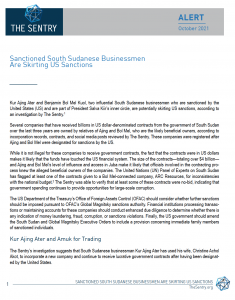 Read the full alert and recommendations
Read the full alert and recommendations
Kur Ajing Ater and Benjamin Bol Mel Kuol, two influential South Sudanese businessmen who are sanctioned by the United States (US) and are part of President Salva Kiir’s inner circle, are potentially skirting US sanctions, according to an investigation by The Sentry.*
Several companies that have received billions in US dollar-denominated contracts from the government of South Sudan over the last three years are owned by relatives of Ajing and Bol Mel, who are the likely beneficial owners, according to incorporation records, contracts, and social media posts reviewed by The Sentry. These companies were registered after Ajing and Bol Mel were designated for sanctions by the US.
While it is not illegal for these companies to receive government contracts, the fact that the contracts were in US dollars makes it likely that the funds have touched the US financial system. The size of the contracts—totaling over $4 billion—and Ajing and Bol Mel’s level of influence and access in Juba make it likely that officials involved in the contracting process knew the alleged beneficial owners of the companies. The United Nations (UN) Panel of Experts on South Sudan has flagged at least one of the contracts given to a Bol Mel-connected company, ARC Resources, for inconsistencies with the national budget.* The Sentry was able to verify that at least some of these contracts were no-bid, indicating that government spending continues to provide opportunities for large-scale corruption.
The US Department of the Treasury’s Office of Foreign Assets Control (OFAC) should consider whether further sanctions should be imposed pursuant to OFAC’s Global Magnitsky sanctions authority. Financial institutions processing transactions or maintaining accounts for these companies should conduct enhanced due diligence to determine whether there is any indication of money laundering, fraud, corruption, or sanctions violations. Finally, the US government should amend the South Sudan and Global Magnitsky Executive Orders to include a provision concerning immediate family members of sanctioned individuals.
Read the full alert >

